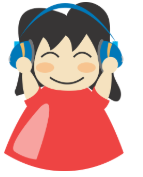
Brains On! Podcasting

Overview
Brains On! is an award-winning audio show for kids and families. Each week, a different kid co-host joins to find answers to fascinating questions about the world. Brains On! encourages kids’ natural curiosity and wonder using science and history.
Students will listen to a podcast and create a graphic organizer sharing information about the podcast.
Learning Objectives
Students will:
- Be able to listen to a podcast on Brains On!
- Be able to create a graphic organizer that connects to the podcast.
- Be able to share their information with others.
Vocabulary
Vocabulary Words:
-
Podcast: A podcast is a digital audio file made available on the Internet for downloading to a computer or mobile device, typically available as a series, new installments of which can be received by subscribers automatically.
-
Connections: Connections are a relationship in which a person, thing, or idea is linked or associated with something else.
Pre-planning
To prepare for this lesson:
-
The teacher accesses the Brains On! website.
-
The teacher selects and listens to the podcast first for the students.
-
The teacher selects a graphic organizer for students to use.
-
The teacher may choose to set up a listening station or provide a podcast link to students in a Learning Management System.
-
Check out this FREE podcasting graphic organizer template from teachers pay teachers. You will have to create an account to access the template.
-
Here is an assortment of FREE science graphic organizers.
Note: For an additional website on listening comprehension, the teacher will create a FREE teacher account on Listenwise. There the teacher will have access to over 1500 curated podcasts that can be played by the teacher to the classroom.
Accommodations
See the Accommodations Page and Charts on the 21things4students website in the Teacher Resources.
Steps
Directions for this activity:
-
The teacher selects a podcast for students to listen to. This can be set up at a listening station, sent to students through a learning management system or provided with a link.
-
The students listen to the selected podcast.
-
After listening to the podcast students complete one of the graphic organizers selected by the teacher with information learned from the podcast.
Assessment Options
Different options for assessing the students:
- Observations
- Check for understanding
- At the end of the week, create a Kahoot with questions from the podcast.
- Have students respond to a group discussion about the podcast topic.
- Students share their thoughts and learnings through discussion.
- Exit tickets.
- Students create a comic strip of their learning.
MITECS COMPETENCIES & ISTE STANDARDS
MITECS: Michigan adopted the "ISTE Standards for Students" called MITECS (Michigan Integrated Technology Competencies for Students) in 2018.
Knowledge Constructor
3a. Students plan and employ effective research strategies to locate information and other resources for their intellectual or creative pursuits.
3b. Students evaluate the accuracy, perspective, credibility and relevance of information, media, data or other resources.
3c. Students curate information from digital resources using a variety of tools and methods to create collections of artifacts that demonstrate meaningful connections or conclusions.
3d. Students build knowledge by actively exploring real-world issues and problems, developing ideas and theories and pursuing answers and solutions.
Devices and Resources
Device: PC, Chromebook, Mac, iPad
Browser: Chrome, Safari, Firefox, Edge, ALL
Apps. Extensions, Add-ons
Websites:
Brains On!
CONTENT AREA RESOURCES
ELA
- Use graphic organizers to organize information. Write a summary of what was learned.
- CCSS.ELA-LITERACY.SL.3.1
Engage effectively in a range of collaborative discussions (one-on-one, in groups, and teacher-led) with diverse partners on grade 3 topics and texts, building on others' ideas and expressing their own clearly.
Integrated Arts
Draw a picture with captions to show what was learned.
Science
Students create individual or group diagrams.
Social Studies
Students can write a brief page on the topic to create a class book.
Credits
This task card was created by Julie Hoehing, Lake Shore Public Schools, July 2019. Updated March 2025.


